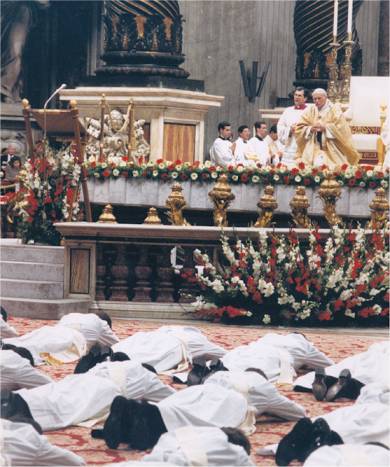The last week of Easter finds us hearing the Great Priestly Prayer of Jesus from the Last Supper in the Gospel of John. In this prayer, we hear Our Lord discussing how he draws us, his disciples, into the very mystery of the Love that exists between He and the Father.
I think it behooves us to reflect a bit more on that mystery, considering events of the past week in Miami.
As we reflect on the Mystery of Love, we must first ask what exactly 'Love' is. Pope Benedict gives us a great insight into 'Love' in his first encyclical: Deus Caritas Est, which I have just gone through again, this time with some of the men entering the seminary this fall.
In this seminal work of re-evangelizing the faithful, the Holy Father breaks the mystery and nature of Love into two general categories, using the Greek terms Eros and Agape.
He defines Eros as the lower form of love, the love the seeks to possess. It is the love that leads to a desire to sieze, grasp, control. It is a love that sees in the other (person/thing/idea) a good, and which is drawn to that good, but in a self serving kind of way, and to share is to somehow lose popssession of that object/person/idea.
You can see this in the play of young children: MINE! They refuse to share that object, for they fear they will never get it back again. When a niece of mine was one and half years old, her dad attempted to hold another baby, a newborn. She wanted nothing to do with it! 'He's MY daddy!'
This initial aspect of love is good in so far as it ignites our passions to go forward and seek out, yet it must be tempered with something greater, a deeper style of love, and this is where Agape enters into the picture.
Agape, as defined by Pope Benedict, is the love that seeks to sacrifice the self for the sake of the other. This is the love which Jesus refers to when he says: 'No one has greater love than this, to lay down one's life for a friend.' Here, we realize that to truly be near to another, we must freely give the self to the other.
This is the love that is at the heart of the mystery of the Trinity, for in the innermost dimension of the Trinity is a complete gift of self to the other persons of the Trinity: the Father competely pours out Himself to the Son, the Son returns everything back to the Father; the Spirit erupts from this inner exchange.
When we experience this type of love, both giving and receiving, we are drawn into the very mystery of the Trinity, and how sweet it is.
This is the love that forms a man who is a priest to be able to give his life in service of the Gospel. This is the love that forms a husband and wife in a complete exchange of self, so powerful that nine months later, it takes a name.
This is, unfortunately, also the love that the world does not understand and cannot grasp, for it is the antithesis of Original Sin, and this is where the incidents in Miami come into play.
But before addressing our fallen priest, we first return to that first Fall. The question arises as to what was that Original Sin? What is the origin? It started before Adam and Eve, with the Fall of the Angels.
Lucifer, the one who was to bear the Light of Christ to the World, saw his position and rejected it. Instead of giving himself for God's designs, as is proper to the Angels, his initial reaction was: 'I will not serve!'
This is the trick the Evil One played on Adam and Eve, convincing them that it is better to serve oneself rather than serving God. (When listening to the Devil's cunning tricks, remember the maxim: 'Half truths are like half bricks, you can throw them farther.')
When looking at the Fr. Cutie situation, admittedly from a distance, it seems that this is the root of what is happening here. He knew the rules by which he was to live by, celibacy is not 'optional.' Yet, when faced by the possibility of a seeming good, he fell into the traps of Eros unbridled, unrestrained by the higher Agape. And worse, when push comes to shove, his response: 'I will not serve.'
I pray for him, as well as for the other brothers who have left the priesthood. But it also causes me a reminder, as it should all priests (and even married folks), to keep in mind the desire and obligations of Agape: true love is found in giving of the self freely, honestly, and openly.
Then, with grace of Christ giving us the strength, we might be able to utter with all weakness: 'I WILL serve.'











